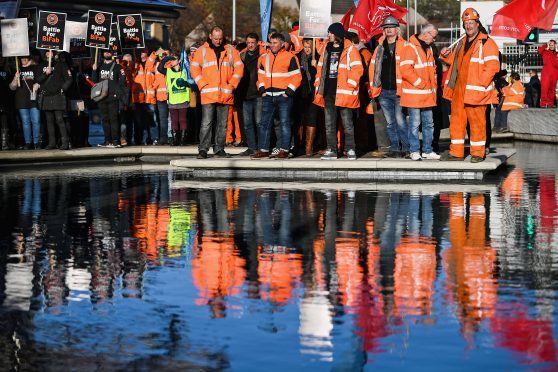Sir, – Burntisland is no stranger to companies folding. Burntisland Ship Building Company went into receivership showing a profit. Fifteen hundred highly skilled ship builders were thrown on the dole almost 50 years ago and it is has been more of the same ever since.
Politicians say plenty but do little. When asked about saving jobs, the normal reply is there is no money. No money! How about using the fifteen billion in aid we give away like some drunk trying to impress the bar by buying drinks for everyone when his own family are in need of food.
I have not heard one politician asking the British Government to come to the aid of this workforce and nationalise the company.
If they can nationalise banks why can’t they save a skilled workforce that has, over the years, saved the UK by building the North Sea oil industry.
If nothing is done the suppliers will quickly stop supplying. The workforce is bending over backwards to help but if the banks refuse loans, all is lost. Let’s see the politicians asking central government for real help. Words don’t pay bills. Nationalise the company now.
John Phimister.
63 St Clair Street,
Kirkcaldy.
Gender laws on the right path
Sir, – There is a great deal wrong with Dr Stuart Waiton’s opposition to reform of the gender recognition laws (Courier, November 15).
Dr Waiton says: “Eighteen year olds can do what they like with their bodies.”
Well (within certain limits) he is correct, but in Scots law the key age is 16, not 18.
We have full capacity at 16 by virtue of the Age of Legal Capacity (Sc) Act 1991, and so setting the age for gender change at 18 has always been absurd.
Dr Waiton also condemns the idea that a child who is under 18 but has sufficient maturity to understand complex medical or legal concepts might be able to speak to their parent, or a medical or social worker, or legal professional about changing their gender because, according to him, children between 12 and 18 “don’t have the ‘right’ to go to bed when they want, let alone anything else”.
Again this is simply not true.
The 1991 Act allows young people under 16 to make medical, contractual and other decisions provided they are of sufficient maturity and with protections built-in.
So, in respect of the ages at which people can make legally significant decisions, the proposed changes to the gender recognition scheme are simply bringing the provisions into line with long-established, uncontroversial law.
Brian Dempsey.
Lecturer,
School of Social Sciences,
University of Dundee.
Division is not the answer
Sir, – Your correspondent Allan MacDougall (November 14) once again tries to persuade us that black is white in matters of Scottish Independence issues.
The error made by all Secessionists is to expound upon ancient history, instead of examining the future justifications for the fragmentation of stable sovereign entities which have, as in our own UK, provided a reasonable standard of living and life opportunity for many generations of our people.
The particular error of Mr MacDougall is to try to persuade us that all is well in the countries of the former Yugoslavia since the recent Balkans Wars of the 1980s. It is simply not the case.
There remain deep resentments in those countries whose people suffered appallingly during the conflicts. It should be remembered that the cause of the Balkans War was the extreme nationalist views and actions of Serbia.
Closer to home, in the 1970s we witnessed the armed nationalist movement in Ireland, hell-bent on removing Northern Ireland from the UK by threat and terrorism.
There is simply no logical case for Scotland to be outwith the UK, neither in terms of economic betterment, nor improved governance.
We have yet to see the SNP, that so ill-informs the people of Scotland, properly represent Scotland at Westminster instead of the present, quite useless, approach of always questioning and criticising the policies of the UK Government while trying to maintain a dignified aloofness that fools no-one except for the SNP acolytes.
Fragmentation of centuries-old democratic sovereign states is not the best way forward for the future benefits of the world’s citizens.
Derek Farmer.
Knightsward Farm,
Anstruther.
Smacking: Will I be a criminal?
Sir,– I need help and am wondering if you, or your readers, could provide it.
I fear I am about to become a criminal because, being an honest man, I shall have to plead guilty to having smacked my children.
The fact they are now grown up, very balanced, very successful people seems irrelevant.
Our love and respect for each other is a great joy to me, and I am very proud of what they have become, but am now worried that I, and many thousands of good parents like me, are about to be deemed guilty of “abusing” our children if the proposed, very confusing, legislation succeeds.
Will there be a “statute of limitation” on the “crimes” we have committed innocently (no excuse in law?) over the years, or can we all expect to be caught in the big net, accused of a type of “child abuse”?
Will there be enough police to come knocking on all our thousands of doors (ironically on their own colleagues’ doors too, since I am sure the majority of police will have disciplined their own children in love)?; and while they are doing that, who will be taking care of the children who really are being abused?
What is lacking in current legislation in this regard?
What should we do?
Barrie Stocks.
Flat 4, St Helens,
474 Perth Road,
Dundee.
The archetypal African dictator
Sir,– One of Africa’s most incompetent tyrants, “Mad Bob” Mugabe turned Zimbabwe from one of the continent’s greatest breadbaskets into an economic basket-case during a reign which has, hopefully, now drawn to a close.
Though he became prime minister in 1980 and president 1987, he maintained the mindless drivel of the Cold War’s revolutionary socialist rhetoric across three decades – truly years the locust has eaten!
While his fellow “leaders” on the continent have understandably been reluctant to criticise him, Archbishop Desmond Tutu got it absolutely right when he called him “a cartoon figure of the archetypal African dictator”.
Rev Dr John Cameron.
10 Howard Place,
St Andrews.
Flags don’t mean unity
Sir,– Allan A. MacDougall (14/11/17) quite rightly challenges Derek Farmer’s views regarding nationalism.
Mr Farmer, in his condemnation of nationalist zealotry, appears to be blind to the rise of post-Brexit English nationalism.
Demanding control, wrapped in a Union flag they believe to be their property, they sing “God Save the Queen” to honour someone who is shown to be perfectly capable of saving herself.
Mr Farmer’s unfortunate terminology regarding Catalonia includes, “insurrection”, defined as “a violent uprising against an authority or government”.
It is, at best, wilfully disingenuous in light of the Catalan government’s efforts to achieve a peaceful settlement. His mantra during the self-same situation in 2014 Scotland was “negotiation, not separation”.
Westminster has since shown their contempt towards such an approach. Meanwhile, the Catalans are given similar advice.
London and Madrid behave as though cloaking territories with flags in the pretence they are united and indivisible is acceptable in this post-imperial world. It is not.
Catalonia has consistently voted for a pro-independence parliament, a democratic choice which deserves respect .
Ken Clark.
335 King Street,
Broughty Ferry,
Dundee.










